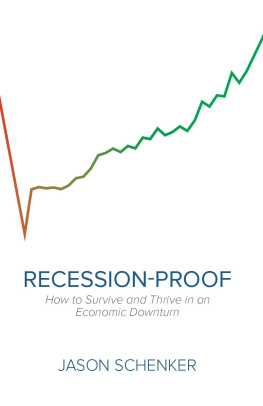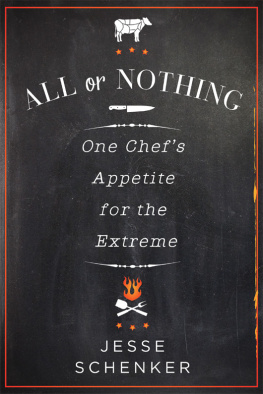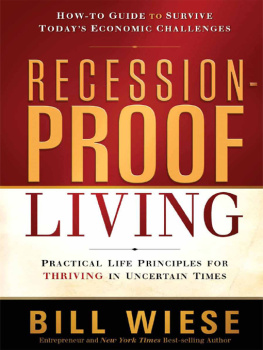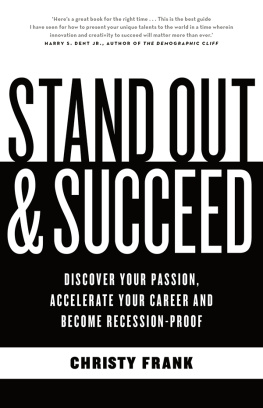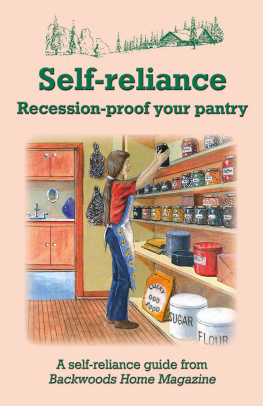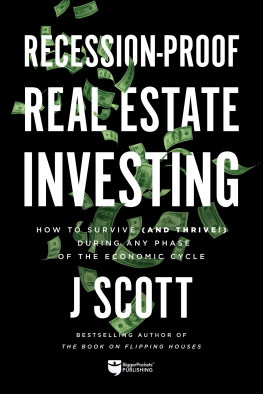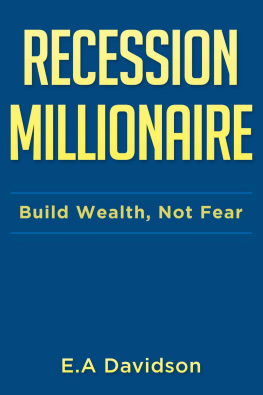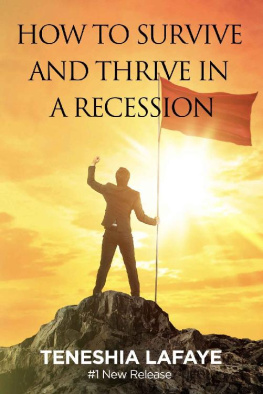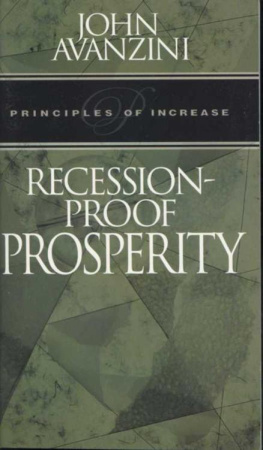C opyright 2016 Prestige Economics, LLC.
All rights reserved.
F or those struggling in a recession .
Introduction
Why I Wrote This Book for You
I n 2001 , I finished graduate school and walked right into a recession. I wasnt an economist at the time, but my career was hurt by the economy. I remember thinking that if I had known a recession was coming, I would have done things differently. My major, graduation timing, and summer job choices would have reflected my knowledge of a coming recession. Unfortunately, they did not. Because of the 2001 recession, I vowed to become an economist, so I would be able to see the next recession comingso that the next time, I could be recession-proof.
Not many people get burned by a recession and become an economist to better manage it the next time around, but thats exactly what I did. By the time of the Great Recession of 2007-2009, I was an economistand this time, I was prepared for it. I used my economic knowhow to run, build, and invest my way out. One of the things I did was to start my company, Prestige Economics, and I took it from nothing to where we are nowthe worlds leading independent commodity and financial market research firm.
Now, with the threat of another U.S. recession on the horizon, I wanted to share what I learned in the last two recessions. Im sure youve heard the phrase, If I only knew then, what I know now. For me, this book contains everything I wish I knew going into the recession of 2001 and the Great Recession.
My advice in this book should help you be recession-proof, by showing you how to:
- Predict the next recession with just a few clicks of your mouse
- Turn the bust years into a moneymaking opportunity
- Escape a doomed industry before its too late
- Keep your job long after your colleagues have been laid off
- Take refuge in a safe-haven sector
- Move where the money is
- Safeguard your retirement
- Survive a charging bull (really)
The next recession may be closer than you think, and this book should help you be recession-proof, without becoming an economist.
You are In Good Company
As the Founder, President, and Chief Economist of Prestige Economics, I advise big publicly-traded corporations, small privately-owned companies, and everything in between. Central banks, government bodies, high-net-worth individuals, airlines, oil and gas companies, material handling companies, auto manufacturers, mining companies, transport companiesall of them pay for my advice. My clients come to me for knowledge about risk management, strategy, and forecasting. Basically, I help them understand their risksand I help them find upside opportunities in those risks. This is exactly what this book should do for you. This book should help you find upside in an economic downturn.
Aside from helping my clients find upside in their downside risks, they also come to me, because my financial market forecasts and predictions are right, again and again. In fact, Im one of the most accurate economic forecasters in the world. Bloomberg News publishes rankings of the most accurate forecasters at predicting what oil, natural gas, metals, currencies, unemployment rates, and so forth are going to do. Either the price of oil goes over $50 a barrel when you said it would, or it doesnt. This is total accountability, total objectivityyoure putting your money where your mouth is. So when I tell you that Prestige Economics has been top ranked for forecasts across every quarter that weve been forecasting, and that weve been top-ranked in 27 different categories, you can be sure that its not just hype. And you can be sure that my advice can help you in recessions to come.
Forewarned Is Forearmed
I wrote this book to give you the upper hand that I give to my clients. When people hear the name of my company, they often think that the word prestige refers to my companys gold-plated reputation. But thats not actually how I intended it. Prestige is derived from a French word meaning trickthink of the movie The Prestige, which is about magicians and their secrets. Prestige Economics is all about pulling the curtain away from the wizard, seeing how the rabbit emerges from the hat. Its about demystifying this mysterious thing, the global economy, seeing its tricks and sleight-of-hand, and arming clients with tricks of their own to get the best of it. Thats what my services provide, and thats what Im offering you in this book.
So dont give in to the fear. Youll make it through with sound knowledge and smart decisions. Youll make the right gambles, and youll have the best backup plans in place if they dont work out. With this book, youll be ready to survive and thrive in the coming recession, whatever that recession looks like for you.
B efore we go too deeply into our discussion of recession, I should explain what a recession is. Economists say that the country has gone into a recession if there have been two consecutive quarterly declines in growth, as reflected by Gross Domestic Product. Thats just a fancy way of saying that the country has been producing less and less stuff for six months. The definition I like to use is even simpler. A recession is when business activity and income fall across the nation. A recession is when companies are getting smaller, workers are losing their jobs, families are tightening their belts, and everyone is stressing out.
The rhythmic up and down in the economy has a name: the business cycle. The up parts are called growth or expansion. They are heady times when everyone seems to be getting jobs and raises and fat bonuses. People are growing their businesses, making money on the stock market, buying cars, and feeling lucky. The down parts are the recession, when everyone is freaking out and cutting back.
The up part of the business cycle sets up the conditions for the down part, and the down part sets up the conditions for the up part. Its almost a natural law, like the swaying of a pendulum, and its been happening for centuries. Economists usually explain it like this: when the economy is growing, everyone has more money in their pockets, so businesses can charge more for things. Now everything costs more, so each dollar is worth a little less than it used to be. This is called inflation. You dont want too much inflation, because then people lose confidence in the value of money, and all hell breaks loose. The genie gets out of the bottle and its very hard to put it back in.
Theres an old story from Germany after World War I. It was a time of hyperinflation, when inflation was out of control and cash was getting less and less valuable by the hour. A man brought a wheelbarrow full of German Marks to a store to buy a loaf of bread. He went into the store and when he came out again, someone had stolen the wheelbarrow, but left the money. Thats the situation you dont want.
To stave off inflation, the central bank (in the United States, its called the Federal Reserve) raises the interest rate (the price of money) to make it more expensive for people to get loans. Now theres less money around, so businesses cant keep growing and raising prices. Economic growth slows, which slows inflation. Sadly, business contracts. Families cut their expenses. Voil, recession.

